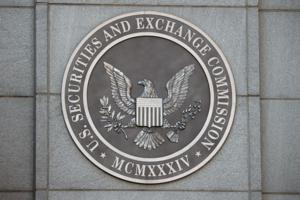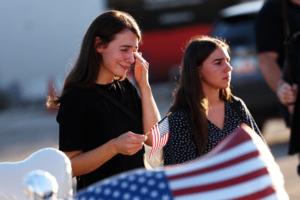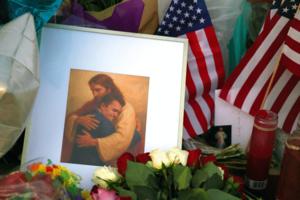Politics
/ArcaMax

Commentary: What Pam Bondi gets wrong about 'hate speech'
What is the federal offense of “hate speech”?
It’s a good question because there is no such offense. That didn’t stop U.S. Attorney General Pam Bondi from threatening to use the authority of her office to combat it. “We will absolutely target you, go after you,” she said, “if you are targeting anyone with hate speech.”
Bondi ...Read more

Commentary: In dark times, Americans need leadership that unites
The assassination of Charlie Kirk has cast a dark shadow over the country, not only because the deed itself was abominable, but also because the reaction to it has been so disturbing. Instead of bringing out the best in America, as tragedies once did, it is bringing out the worst — in both parties.
It should go without saying that political ...Read more

Ronald Brownstein: 'Color-blind' conservatism has some holes in its logic
The Supreme Court and President Donald Trump’s administration are mounting parallel crusades to virtually eliminate the use of race in government decision-making.
With one conspicuous exception.
Between them, the court’s Republican-appointed majority and the Trump administration have severely limited, and in some cases outright banned, the...Read more

Editorial: Liberation Day tariffs are an increasingly costly mistake
Amid the president’s blitz of tariff initiatives, the April “Liberation Day” scheme is an outlier. Rather than targeting specific products or countries to advance a policy goal, it imposed across-the-board duties, relied on vague justifications, and proved so harsh and omnidirectional that it induced a market crash. It was also premised on...Read more

Noah Feldman: Blaming violence on free speech is a very old trick
In the wake of Charlie Kirk’s assassination, the Trump administration is following a very specific, very old script. It argues that political speech causes political violence, and that this speech must therefore be punished.
It is imperative that all defenders of free speech — whether on the left, right, or in the center — reject this ...Read more

Commentary: Jimmy Kimmel and the threat that comedy poses to autocrats
The abrupt suspension of comedian Jimmy Kimmel’s late-night show on ABC might seem like the least of our worries amid the shuttering of government agencies, the collapse of congressional checks on executive power and bands of ICE agents detaining people on the basis of race or language. But humor matters.
While the news media is sometimes ...Read more

Commentary: Thank the bees this apple season
In many places, autumn is synonymous with apples. Apple-laden orchards invite us to pick our own, farm markets boast gorgeous bushels of Granny Smith and Honeycrisp (my favorite) and homemade apple pies cool on kitchen countertops. We often thank farmers for this bounty, and rightly so. But someone else deserves our gratitude as well: bees.
...Read more

Marcos Breton: ABC didn't just yank Jimmy Kimmel off the air. It crossed a dangerous line
If comedians are not allowed to make jokes that are hated by the president of the United States and his supporters, it suggests a future for our nation that is less free and more dangerous for all, including those laughing and cheering that ABC yanked Jimmy Kimmel off the air on Wednesday.
Go ahead and laugh if you want because it’s a free ...Read more

Commentary: Jimmy Kimmel's cancellation is un-American
Few pieces of political writing are as widely misunderstood, misinterpreted and falsely disseminated as the First Amendment to the U.S. Constitution.
For years, whenever a public figure has faced backlash and consequences for social media posts, public comments or even private statements that offended people, self-proclaimed defenders of free ...Read more

Editorial: That was a lousy bit, Jimmy Kimmel. But there's no role here for government intervention
We were not fans of Jimmy Kimmel’s riff on the shooting of Charlie Kirk and the implication that President Donald Trump cared more about the new ballroom at the White House than the death of a close ally.
The late-night host’s monologue on “Jimmy Kimmel Live!” was tasteless, unfair and, frankly, cruel, given that all the evidence points...Read more

David Mastio: Disturbing Kimmel suspension reflects a problem bigger than censorship
Jimmy Kimmel is the latest cancel culture casualty of the Charlie Kirk mourning period. His sin is a vague and poorly considered monologue that led many to the reasonable interpretation that he was blaming MAGA for the murder.
“We hit some new lows over the weekend with the MAGA gang desperately trying to characterize this kid who murdered ...Read more

Anita Chabria: Wake up, Los Angeles. We are all Jimmy Kimmel
Comics have long been on the front lines of democracy, the canary in the cat's mouth, Looney Tunes style, when it comes to free speech being swallowed by regressive politics.
So Jimmy Kimmel is in good company, though he may not like this particular historical party: Zero Mostel; Philip Loeb; even Lenny Bruce, who claimed, after being watched ...Read more

Luis F. Carrasco: Why Jimmy Kimmel's forced hiatus isn't just another cancel culture rampage
Too many people in this country think that free speech comes with no consequences. A constitutionally protected free pass to say whatever you want with zero repercussions. But that’s not true. There is a cost to speaking out.
On the left, think Colin Kaepernick being blackballed by the NFL for taking a knee during the national anthem. On the ...Read more

Editorial: Trump's attacks on free speech are only the beginning
It has come to this: The president of the United States is leading the strangulation of free speech.
And many institutions continue to fall in line.
Donald Trump celebrated the spineless move by ABC to suspend Jimmy Kimmel’s late-night show after the comedian referenced the politicization surrounding the assassination of right-wing activist ...Read more

Editorial: ABC was wrong to sacrifice Kimmel: Disney's cowardly surrender to Trump harms all Americans
ABC television and its corporate parent Disney wrongly sidelined comedian Jimmy Kimmel rather than resisting the unconstitutional demands of Donald Trump and his Federal Communications Commission Chair Brendan Carr. By putting their self interest above what is right, Disney is aiding Trump’s ever greater grasping for power that does not belong...Read more

Trudy Rubin: Trump-endorsed suspension of 'Kimmel' recalls Putin's 'Puppets' takedown
When ABC announced it was indefinitely suspending the late-night Jimmy Kimmel show under severe pressure from the Trump administration, I recalled Vladimir Putin’s deep hostility to Russia’s beloved satirical puppet show Kukly (known in English as Puppets), which lampooned him as an evil gnome.
A year into his presidency, Putin managed to ...Read more

Allison Schrager: Earnings reports don't need to be quarterly
Once again, the president is questioning what purpose is served by publicly traded companies issuing quarterly earnings reports. Not only did Donald Trump raise this issue back in 2018 — so did Barack Obama in 2015.
Which just goes to show that the arguments against quarterly financial reports are neither crazy nor new. It was not until 1970 ...Read more

Commentary: Charlie Kirk's legacy lives in the voices of young people he inspired
When people think about legacies, they often think about monuments, textbooks or days marked on a calendar. But a true legacy is measured in lives changed and conversations sparked. That’s why, when we think about Charlie Kirk, we don’t just think of a man who built organizations or packed auditoriums. We think of the way he taught ...Read more

Commentary: How I took steps in my 20s as a 'previvor' to avoid getting cancer
I’ve never had cancer. But it has still shaped my entire life.
I’m a BRCA1 “previvor.” You may never have heard that term before; it was coined by an organization called FORCE over 25 years ago. I carry a gene mutation that increases my risk for breast and ovarian cancer and other kinds, and that’s why, even though I’m in my late ...Read more

Commentary: The right now embraces cancel culture
In the days since Charlie Kirk’s killing, conservatives have embraced a phenomenon they previously called toxic: cancel culture.
The impulse to cancel some voices this past week is understandable: Celebrating murder is cruel. It’s gross. It’s wrong. But the irony is impossible to miss: Conservatives, who long treated cancel culture as an ...Read more






















































